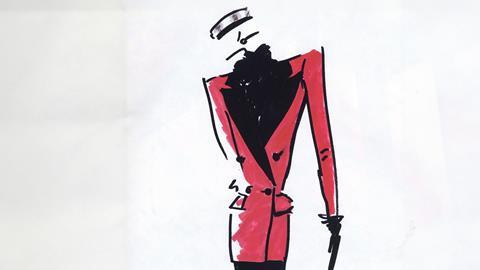Rev Katherine Chow juxtaposes the power dynamics she was used to when working for a law firm to those found in the New Testament
When I was living in New York in my 20s, I became familiar with the concept of power dressing. This phenomenon started in business and politics in the 1970s, when women adopted a particular style of fashion to help them establish their authority in environments that were historically male-dominated spaces. I remember my female boss at the time, a New York City law firm partner who I respected, giving me a bright red two-piece skirt suit. She said red was the ultimate power colour and that if I wore this suit I would stand out and be noticed in the room. The thing is, I definitely didn’t want to stand out or want anyone to notice me and bright red was definitely not my preferred colour of choice.
I remember walking into different rooms in my ten years living in New York City, where power permeated across particular spaces – board rooms, convention centres, networking events, gallery openings and private members’ clubs. The early morning power breakfast at fancy restaurants was indeed a thing, where the movers and shakers in the city negotiated terms, talked shop and sealed the deal with a firm handshake over strong coffee, eggs and perhaps a pastry before 8am. I quickly learned how to identify who the power brokers, decision makers and gatekeepers were in a room, and who had the influence to help me get closer to where I wanted to be career wise.
I sometimes forget how the younger version of me felt when I put on my power outfit of black suit, black heels, black tights, clutching my makeup bag full of war paint while internally reciting the pep talk in my head that went something like: “I am a strong independent woman” over and over again. As I pounded the pavement on the streets of Manhattan and tried to keep up with the ambitious, frenetic, hustler mentality of the city, I fought hard against the insecurity, inadequacy and imposter syndrome we all feel inside because of our imperfect humanity.
What God says about power
Power is an interesting thing. It can be explored in a number of ways, from a variety of different angles. It’s often described as the way we influence others or the way to improve our position within an organisational structure. Power gives us the capacity and agency to act and to have our ideas and work taken forward. Where there are people, there are power dynamics. From the world’s perspective, power usually comes with title, status, authority and control; the accumulation and acquisition of power is seen as a desired life goal.
But what does God think about power and what is power really about in his kingdom? In Acts 1, Jesus commanded his disciples to wait for the promised gift from the Father, stating that they would receive power when the Holy Spirit filled them and that they would testify about Jesus with global reach and impact (Acts 1:4-8). The apostles and women gathered together in the upper room of the house they were staying in and waited for God in constant prayer (Acts 1:12-14). How different the upper room must have felt compared to the corridors of power in New York City.
[Holy Spirit] power doesn’t highlight the spectacular gifts and abilities of the recipient, but instead demonstrates the extraordinary nature and grace of God
Fifty days later, on the Day of Pentecost, when they were all together in one place, all of them were filled with the Holy
Spirit and supernaturally empowered, equipped and enabled to speak in different tongues and languages (Acts 2:1-4). What was the posture of the people in the upper room? What do God’s movers and shakers look like? Well these people waited in prayer, as they recognised that the power they were looking for is a gift that comes from God; it isn’t something they could grab or grasp for themselves – instead it is bestowed. These people weren’t self-sufficient and independent, they depended on God and clung onto his promises even in times of confusion. They were filled with the Holy Spirit from the inside out and “clothed with power from on high” (Luke 24:49).
The power they received wasn’t to be hoarded or used to control, dominate or manipulate; it was not power for personal gain. God’s Holy Spirit empowers us to serve, to speak for Jesus and to bring about kingdom transformation where he’s placed us. It often moves us not up the ladder but down and out into service. That’s the general shape and movement of God’s kingdom. This power doesn’t highlight the spectacular gifts and abilities of the recipient, but instead demonstrates the extraordinary nature and grace of God. Often those who are filled with God’s Spirit still feel weak and inadequate in their own imperfect humanity, but they also carry a quiet and humble confidence in God.
Jesus lived in a deeply patriarchal society where women were relatively powerless. The way he interacted with women was disruptive and uncomfortable to the surrounding culture at the time. Instead of controlling, subjugating and objectifying women, Jesus lifted them up, liberated and empowered them. He gave women authority and a voice in male-dominated spaces. He clothed them with power from on high and continues to do so today. I think this is the kind of power dressing I’m interested in.


































No comments yet